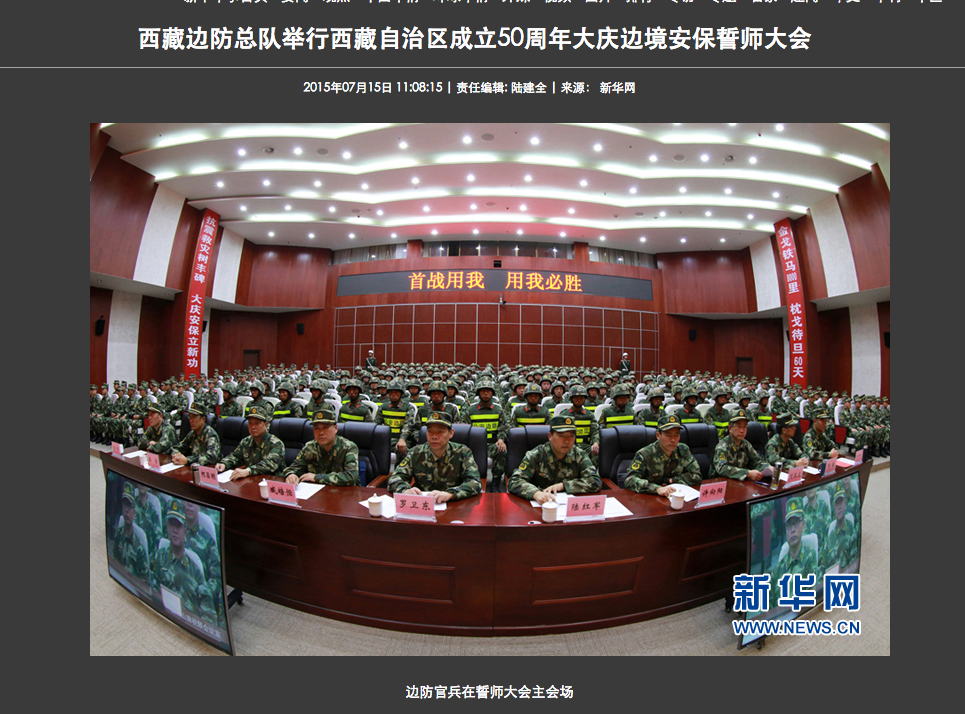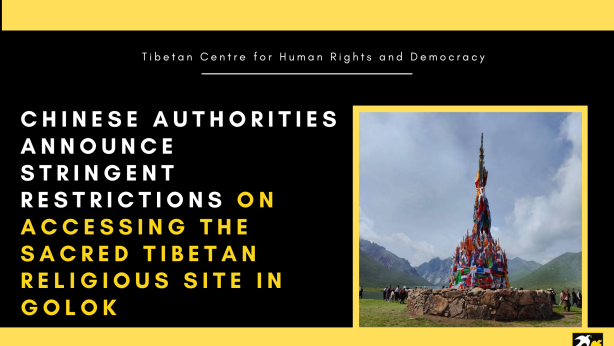New crackdown campaign introduced in Tibet ahead of sensitive anniversary celebrations

In preparation for the 50th founding anniversary of Tibet Autonomous Region (TAR), the Chinese authorities have begun implementing the ‘Clean Sweep and Strike’ (Ch: da jian cha) campaign ostensibly to provide security to postal activities. Under this campaign, the TAR authorities will monitor and surveil postal exchanges between Beijing and TAR, and monitor and prohibit arms and ammunitions, knives, explosives, including dangerous chemicals, and also leaflets and other political publications. Even remote-controlled toys such as miniature planes will be banned from flying particularly in the urban skyscape. The Internet activities will come under increased surveillance.

Security meetings for the anniversary celebrations are being convened at the grassroots level in TAR. Chinese soldiers and policemen are being assembled and security measures have been beefed up. Public places such as restaurants, schools, beer bars and Karaoke bars have come under the scanner. Restrictions are being placed upon the movement and activities of Tibetans.
On 11 August 2015, the State Post Bureau of the People’s Republic of China (PRC) sent an official circular to provincial, regional, and township bureaus. The circular called for strict control over all channels of communication. All the communication materials such as letters and parcels sent from TAR to Beijing from 20 August to 12 September will be searched through and strictly monitored. All the names of the people who post and receive letters or speed posts will be registered and verified.
According to the circular published on the website of the PRC’s State Post Bureau: “All communication materials including speed posts sent from TAR to Beijing between 20 August to 5 September, and all letters and communication materials sent from Beijing to TAR between 20 August to 12 September will pass through officials responsible for investigating them. All these communication materials should be thoroughly searched, monitored and controlled. The real names and addresses of the senders and receivers of these postal materials should be registered and investigated. Various organs of the government should also establish small postal security bureaus to ensure the security of communication and materials. All officials, by turn, should conduct a 24-hour search and monitoring of the communication materials. In the event of any unexpected incidents, they should report it in a timely manner; moreover, detailed control mechanism or laws should be adopted, and forwarded to the heads of the postal bureaus and those responsible for Internet control, who must be made responsible for the security of communication channels and materials by taking their signatures on a document. In short, measures of control should be efficiently implemented, as directed by the government.”
The PRC authorities justify this pervasive intrusion into private communication of citizens as preventive measures aimed at avoiding any untoward incidents that may disrupt three important events: the 50th founding anniversary of TAR on 1 September; the 70th anniversary of China’s defeat of Japan on 3 September, and the International Association of Athletics Federations (IAAF) Championships to be held from 22 to 30 August in Beijing. Clearly these measures are meant to avoid any protests at these events, which hold strong propaganda value for the Chinese Communist Party (CCP).

The decision to mark the 50th founding anniversary of TAR was announced by Chinese premier Li Keqiang during the third session of the 12th conference of the National People’s Congress (NPC) held from 3 to 5 August 2015. In his speech at the conference, premier Li said, “We must organize events marking the 50th anniversary of the founding of the Tibet Autonomous Region and the 60th anniversary of the founding of Xinjiang Uyghur Autonomous Region.”
The PRC’s central government has formed a committee that is responsible for organizing the anniversary celebrations. Li Baorong, appointed the chairman of the organizing committee and deputy director of the National Government Offices’ Administration, said, ‘We will successfully organize the anniversary celebrations to the full joy and satisfaction of the central government and the people of the PRC.”
In the afternoon of 1 August 2015, the organizing committee of the 50th founding anniversary of TAR and the Chinese Central Propaganda Department convened a meeting where state media such as the China National Radio, China International Radio, China Central Television (CCTV), media organs of the Central Propaganda Department, and the propaganda organs of the TAR Communist Party submitted proposals on [covering] the anniversary celebrations. Cui Yuying, deputy minister of the Propaganda Department and deputy director of Information Office of the State Council, said, “We should carry out a sophisticated, systematic, free-flowing publicity campaigns that will create an image of a harmonious and stable Tibet within the country and abroad.”
On 12 July 2015, a conference of the TAR border security forces was convened under the slogan “ability to wage war up to 8000 miles of [border areas] and to endure battles for 60 days.” More than a thousand soldiers have made to take oath to ensure security during the anniversary celebrations. Heightened travel restrictions have been placed upon Tibetans.
Restrictions have been placed on foreign travellers to Tibet with the TAR Tourism Bureau rejecting applications for visits in September. Travel permits are still being denied to travelers from Norway, Nigeria and Philippines. Although places in TAR such as Lhasa and other surrounding prefectures and counties remain sporadically open to foreign travelers, some areas, which witness frequent protests against the Chinese authorities, have remained closed for years. All of Chamdo (Ch: Changdu) Prefecture except for Rawok Lake – 8 kms inside Chamdo – has been closed to foreign tourists since 2008. Other areas closed in TAR include some counties in Nagchu (Ch: Naqu) Prefecture. The sacred Lhamo Lhatso Lake remains closed for unknown reasons.
Local organizing committees are also being established in TAR areas. The anniversary celebrations are being planned in seven areas and towns of TAR. Wu Yingjie, the TAR vice party secretary, on being appointed the deputy chairman of the organizing committee of TAR said, “Through these celebrations, we must clearly point out the great achievements that have come out of the implementation of the Regional Ethnic autonomy laws, including the achievements of the Tibetan people in matters of self rule.”
The Tibet Autonomous Region (TAR) was established on 1 September 1965. The founding of TAR traces its roots to the invasion of Tibet by the People’s Liberation Army in 1949. In 1951, following the signing of the 17 Point Agreement, Tibetan national government was converted under duress into a local government. Chinese propaganda declared to the world that the CCP had liberated Tibet. Later the Chinese authorities violated each and every provision of the 17-Point Agreement, which led to the Tibetan National Uprising on 10 March 1959 and the exile of the Dalai Lama to India. On 28 March 1959, the so-called Preparatory Committee for TAR was formed. In order to showcase a semblance of legitimacy, China appointed the 10th Panchen Lama as the chairman of the committee. Later, in the name of the local government of Tibet, a series of policies with colonial overtones were implemented under the rubric of “democratic reforms” and “redistribution of land”. Those who opposed were purged. In 1965, the year TAR was formed, the Panchen Lama was arrested for “opposing socialism and masses” and instigating rebellion.”
The most powerful position in TAR has always been held by a Chinese nationality. The first party secretary of TAR was Zhang Zhingwu, a PLA general who participated in the invasion of Tibet. So far, 13 party secretaries have been appointed in TAR but not one among them is Tibetan. Important posts at other levels of the government, not just at the provincial level, such as county and township levels are offered only to Chinese. The situation is similar in Tibetan areas outside the TAR. Since the 2008 mass uprising in Tibet, Chinese authorities have become increasingly suspicious of party officials of Tibetan descent with a relatively large numbers either demoted or fired from their jobs. The post of the governor of TAR held by a Tibetan is ceremonial at best.
The Chinese government projects the anniversary events as evidence of ethnic autonomy in Tibet and the protection of the minority nationalities’ right to preserve and promote their unique language, culture, religion and way of life. On the other hand, it proclaims that the advanced nationality, that is the Chinese nationality, should help the less-advanced minority nationalities, and that there should be mixing up and cooperation of different nationalities. In other words, minority nationalities should be assimilated.
In the name of economic development, opening of the Western regions and providing aid to Tibet by Chinese towns and provinces, a large number of Han Chinese nationalities are being encouraged to migrate to and settle in Tibet. At the same time, Tibetan nomads are being displaced and uprooted from their ancestral homelands and moved to urban fringes. Tibetans are being encouraged to marry Han Chinese settlers even as they face economic and political discrimination.
The preparations for the anniversary celebrations have worsened an already deteriorating human rights situation in Tibet. Restrictions have intensified on freedom of speech, travel, assembly, religious worship, and related rights. Moreover, Tibetans are required to hoist the Chinese Red Flag, hang portraits of past and present Chinese leaders on the altars of their homes, sing songs of praise for the party-state, to participate in state-organized functions; perform dances, and wear fur-trimmed clothes. With the anniversary celebrations, the PRC is hoping to hoodwink the international community, which has begun to pay more attention to Tibet since the 2008 mass uprising.


